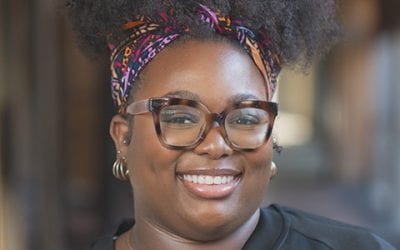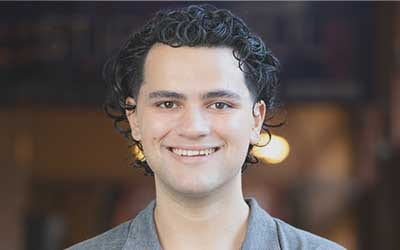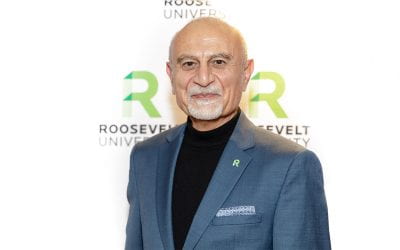President's Perspective
Summer 2023By President Ali R. Malekzadeh, PhD

From its earliest inception, America has been a nation of many peoples from all corners of the globe, so it is hard to imagine how diversity, equity and inclusion initiatives have become so controversial. This is sadly the case, though. Anti-DEI bills have been introduced in 20 different states, and it seems likely that many of those bills will become law. In our current polarized political landscape, DEI has become the latest in a long line of cultural battles, just as critical race theory was a year or two ago.
Although it is tempting to dismiss this as political posturing, the debate over DEI is part of a more foundational debate over issues such as fairness and even about what it means to be American. These are important discussions, although as a professor who spent many years in the classroom, I do wish we could talk to each other in a spirit of generosity and open-mindedness, rather than the angry and divisive tone that pervades so many of our political debates today.
In the midst of all of this heated rhetoric, I think it’s very easy to forget about the most important piece of all of this—the actual students who are most directly affected by these policies. And when we focus on the students, the very real benefits of DEI initiatives come to the forefront of the political baggage that has been tied to DEI policies.
Allow me to tell you the stories of a few Lakers I recently learned about after talking with various students and faculty members over the last several weeks. One student of color said that Roosevelt was the first school she had attended where she felt like she could speak as an individual, not as a representative of an entire race. By contrast, another student told me that he had attended a predominantly white university before Roosevelt and that he had struggled to feel any connection with his fellow students. A third student said that she had never imagined she could be a professor, but after coming to Roosevelt and having several professors who were people of color, she now hoped to become a professor herself.
This sort of diversity and inclusiveness has always been true of Roosevelt. I was fortunate to host alumni Dr. Charles V. Hamilton, Dr. Christopher Reed and Celeste R. James this past April, and their visit served as a reminder of how central these values have always been to Roosevelt. Dr. Hamilton is a former University trustee and taught political science here in 1967-68. He mentored Dr. Reed, and the two became life-long friends as well as leading Black scholars. Celeste James is Dr. Hamilton’s niece, [and she taught elementary for more than 30 years]. All three are part of the larger struggle to create a more diverse, inclusive and equitable world, which shows you how powerful the ripple effects are of these initiatives. They aren’t just changing one or two lives. They have the power to change entire communities and eventually the world.

President Ali with Dr. Charles Hamilton, Dr. Christopher Reed, Celeste James and Dr. Michael Ford
These values were a core part of our own birth. They are part of Roosevelt’s DNA. The University was founded when Edward Sparling resigned as president of Central YMCA College rather than impose racial and religious quotas, and a group of courageous faculty and students followed him. You can see those values made manifest in our current study body. Fifty-two percent of our students are people of color. Forty-six percent of our undergraduates receive Pell grants. Forty-one percent of our students are the first member of their families to go to college. And we have been designated a Hispanic-serving institution by the federal government because more than thirty percent of our student body is Hispanic.
But we can’t rest on our laurels. The battle to create a truly diverse environment in which everyone feels welcome and included in the community and in which all have their needs met as equitably as possible is a never-ending fight. That is why we continue to try to improve in this regard through ongoing DEI initiatives. For example, we have a program to support 120 STEM students per year who identify as first-generation or low-income or who have a documented disability. We also have created the Equity Teaching Academy, a faculty development program centered on issues of equity, difference and inclusion in teaching and learning. These are only two of the many programs we have to try to make Roosevelt a truly diverse and inclusive community that supports all of its students equitably.
Most of the stories in this issue are also focused on these issues. Our cover story is about Lucia Lucas, a Roosevelt alumna who has made history as the first transgender woman to perform a leading role at the New York Metropolitan Opera and the Lyric Opera of Chicago. And Professor Yue Li has written an essay on the importance of diversity of people and thought within the classroom.
I hope our readers will finish this issue with a deeper appreciation for the crucial role that diversity, equity and inclusion initiatives play in higher education. This struggle has been going on a long time. Affirmative action was initially justified based on the idea that diversity was a valuable goal to seek in creating a student body. From the start, though, many resisted—sometimes violently—to that idea. In a 2003 decision that narrowly upheld affirmative action, Justice Sandra Day O’Connor, our first female Supreme Court justice, wrote, “We expect that 25 years from now, the use of racial preferences will no longer be necessary to further the interest [in student body diversity] approved today.” Many people in our nation clearly agree with that idea. I believe her view is far too short-sighted. It is all too easy to fall back into tribalism and narrow-minded views about identity. I’m not sure how many years will be enough time to create a nation that fully embraces diversity, equity and inclusion, but I know these values are worth fighting for. We at Roosevelt will continue to fight for them and do our best to live up to them.
With warm regards,
Ali R. Malekzadeh, PhD
President
Please do not hesitate to let me know your thoughts and ideas about Roosevelt University. Write me at president@roosevelt.edu. As always, I look forward to hearing from you.
More in this section
Chazz Rolle (she/her): Creating a Home in a New Country
Chazz Rolle often contemplates how day-to-day life in Chicago differs so greatly from her hometown in the Bahamas. She has also realized a distinctly American mindset she’s needed to adjust too.
Gabriel Gonzalez (he/him): Embracing an International Mindset
Studying abroad in Spain taught Gabriel Gonzalez to quickly embrace cultural customs. When he wasn’t studying urban planning or Spanish literature, he was able to wander the old world streets, enjoy a tapas meal or explore an art museum.
President’s Perspective
Going to college marks one of the great journeys of our life—from youth to adulthood. These years of focused thought can light a fire of curiosity and wonder that will continue for the rest of our life.



